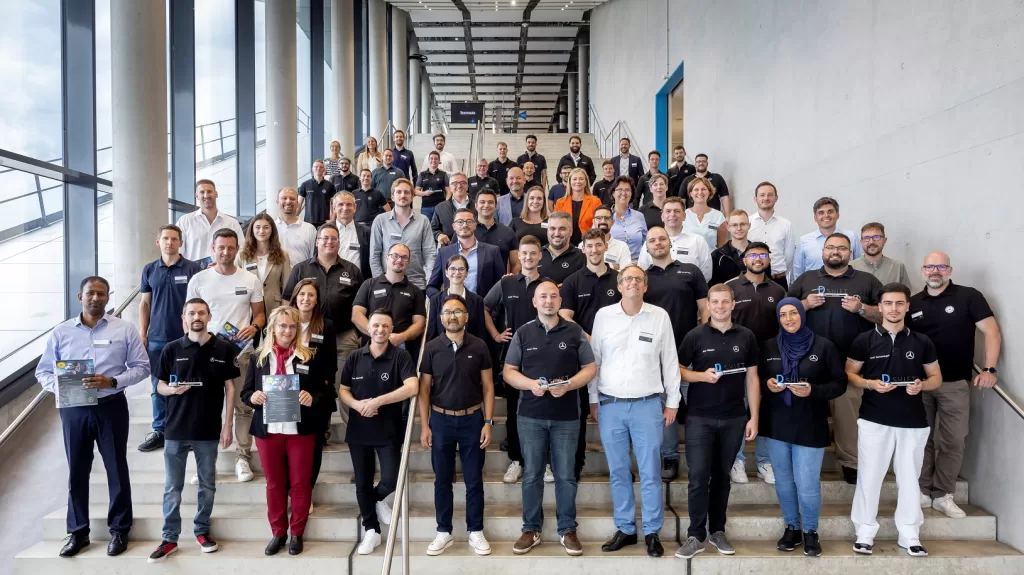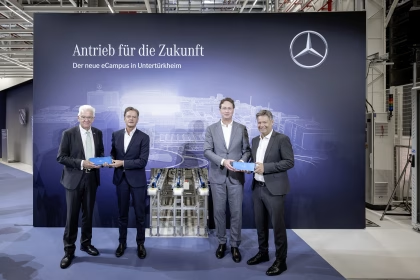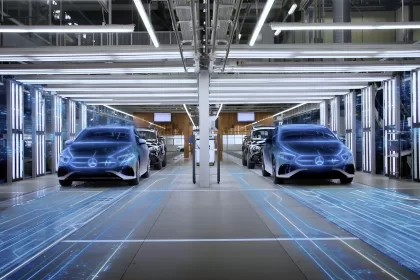- The digital transformation is changing every job profile at Mercedes-Benz
- More than 600 employees are qualified as data and AI specialists as part of two pilot programmes
- First group of graduates receives their certificates
- Mercedes-Benz is further expanding the existing programmes
- Between now and 2030, Mercedes-Benz will be investing more than €2 billion worldwide in ongoing employee development, as part of the training initiative Turn2Learn
With digitalisation and the increasing use of powerful artificial intelligence (AI) systems, every job profile at Mercedes-Benz is changing. As part of the Turn2Learn qualification initiative, Mercedes-Benz is investing more than €2 billion in the qualification of its global workforce until 2030. The Turn2Learn initiative focuses specifically on digitalisation and AI. For example, in the two pilot programmes D.SHIFT and Data Worker, more than 600 employees from production, production-related areas and administration are currently undergoing dedicated qualification to become data and AI specialists. The first graduates will receive their certificates in the next few days. Due to the strong employee interest in this area, Mercedes-Benz is now expanding these programmes.
“To successfully shape the company’s transformation, we don’t just need to have the right digital tools and generative AI applications in place within the company. Of far greater importance is a team that both embraces change and constantly expands its digital skills. The huge interest in courses offered by our Turn2Learn qualification initiative proves that we’ve got exactly this kind of team at Mercedes-Benz. To successfully master the process of change, courage and commitment are necessary. We can see both of these attributes demonstrated by the colleagues who are currently taking part in the D.SHIFT and Data Worker programmes as they continue to invest a great deal of time and energy in retraining and further education. As the world of work continues its massive transformation, lifelong learning will remain the key to success – for us as a company as well as for our employees.”
Sabine Kohleisen, Member of the Board of Management of Mercedes-Benz Group AG responsible for Human Resources, and Director of Labour Relations
Electrification, digitalisation and rapid developments in artificial intelligence are fundamentally changing the working environment. That goes for production, too. Which is why we urgently need more data specialists who are familiar with the production environment and furthermore have a strong grasp of digital tools and their interfaces. And this is exactly where D.SHIFT, the qualification programme for our production employees, comes in. It allows us to provide targeted support to digitally savvy people who have a high willingness to learn and change, and who are also familiar with our production processes.
Following the success of D.SHIFT in Berlin and Untertürkheim, we plan to expand this unique initiative in the coming months.”
Jörg Burzer, Member of the Board of Management of Mercedes-Benz Group AG, Production & Supply Chain Management
“Lifelong learning isn’t something new – but the speed at which technologies and the world of work are changing is. This is why ongoing training and education are a fundamental cornerstone for employment, the future viability of the company as well as for the personal development of each individual. As the works council, it’s our aim to ensure that the transformation of our company is fair, socially responsible and just. To accomplish this, it’s crucial to involve employees in the process. As the General Works Council, we have had a longstanding commitment to qualification training. It is right and proper that the company invests accordingly and sets the course for the effective and continuous qualification. But it also takes a strong will and courage on everyone’s part. I am impressed by the enthusiasm and motivation with which our colleagues have completed their training.”
Ergun Lümali, Chairman of the General Works Council of Mercedes-Benz Group AG
Turn2Learn as a systematic continuation of our approach to employee qualification
Under the roof of the Turn2Learn qualification initiative, Mercedes-Benz offers its employees a comprehensive range of opportunities to learn in a self-determined and flexible manner for their current job or in preparation for their future dream job.
These range from short courses to learning paths and academic degrees. All qualification offered is aligned with the Group’s strategic goals, for example with qualification available in areas including “data science for beginners”; “cloud solution architect”; “hybrid working”; “developing learning routines” and “project management”, through to sustainability topics. The external learning platforms introduced last year are also being widely used: With around 100,000 licences made available companywide for various external learning platforms, learning opportunities have already been accessed more than one million times since the launch.
Investments are being made in the development of digital skills in all areas of the company. In 2022, there were around 120,000 participations in training courses that were related to digitalisation, such as software, coding and IT at Mercedes-Benz Group AG worldwide. In addition, there were more than 77,000 participations in training courses on topics relating to electric mobility at our MB Tech Academies in Germany. Since the beginning of this year, Mercedes-Benz employees worldwide have invested a total of more than 900,000 hours in professional and personal training.
D.SHIFT: Training of talented employees from production for defined target positions in the digital job environment
To actively promote the digital transformation in production, the in-service training programme, D.SHIFT, was launched at the Berlin site in 2021. Employees from production who are interested in data and AI are selected as part of a so-called “Digital Challenge” and retrained as data specialists. Throughout the programme, these employees receive intensive support and guidance and additionally get hands-on work experience with specific practical projects and job shadowing. At the end of the programme, they move into their target positions that were defined and set at the beginning.
After eleven employees successfully completed their retraining in Berlin as part of the pilot project, the D.SHIFT programme was extended to the powertrain site in Stuttgart-Untertürkheim. There, too, 22 Stuttgart colleagues from the area of production have now completed their retraining and moved into their previously defined target positions as data specialists at the Sindelfingen site. The training scheme enables these digital pioneers to qualify for new employment opportunities in areas such as data analysis, artificial intelligence or software programming for electric mobility.
Thanks to D.SHIFT, employees in production can expand their skills, contribute their knowledge of the production environment and align themselves with future-proof job profiles. The response has been enormous across the production site: several hundred employees have applied for the 22 spots in Untertürkheim. Thanks to the success of this programme, D.SHIFT will be further expanded in the coming months.
Data Worker: Selected learning paths for data science and artificial intelligence available to the global workforce
The digital transformation of Mercedes-Benz is being driven forward by data. The goals of a data-driven organisation can only be met if relevant data can be located, accessed, interoperated with and reused in high quality throughout the company. To ensure this in the future and enable data-driven decisions in all specialist areas of the company, there is a need for employees who are responsible for the preparation, analysis and operationalisation of data. Mercedes-Benz has therefore defined specific Data Worker profiles for strategically important data and use cases. In addition to external new hires, the company has been specifically ensuring an increase in qualified specialists through internal retraining as part of the companywide Data Worker pilot programme since 2022. Employees can choose between four special learning paths: Data Product Owner, Data Engineer, Data Analyst and Data Scientist. Depending on the learning path, the training takes between 60 and 400 hours.
“Data plays a key role in the transformation process towards becoming a digital company. Opinions become facts. This is the only way we can create first-class customer experiences and innovative solutions. Qualified specialists such as our Data Workers are the foundation for this. Their expertise makes it possible for us to fully tap the potential from data in a dynamic environment. They also show that the transformation to a data-driven organisation not only creates entirely new roles, but also promotes personal and professional development.”
Jan Brecht, Chief Information Officer (CIO) of Mercedes-Benz Group AG
The initial programme proved very successful. It was not only the participants who learned a great deal: the company did as well. The insights gained have been directly incorporated into the further development of the learning paths. In view of the strategic importance of digital skills, essential modules of the Data Worker learning paths can be booked by all employees. In addition, key content has also been adapted to other qualifications, and further learning paths on the topics of data and AI have also been developed.
Data and AI at Mercedes-Benz
Generative AI applications already are being employed in many areas of the company. As recently as mid-June, the company announced plans to integrate AI into the voice control system of its vehicles. By adding ChatGPT, voice control via the MBUX Voice Assistant’s Hey Mercedes will become even more intuitive. In mid-June 2023, an optional beta programme was launched for customers in the USA whose model series are equipped with the MBUX infotainment system.
Mercedes-Benz is also testing ChatGPT in production, accelerating the use of intelligent tools in the MO360 digital production ecosystem, which was first introduced in 2020. With the aim of optimising the analysis of production data, for example from quality management, ChatGPT will support production employees as a universal, voice-based interface.















